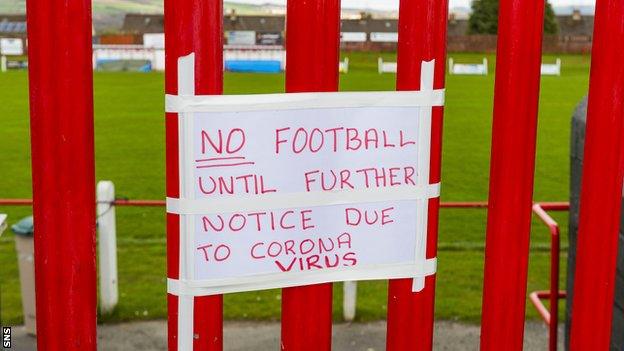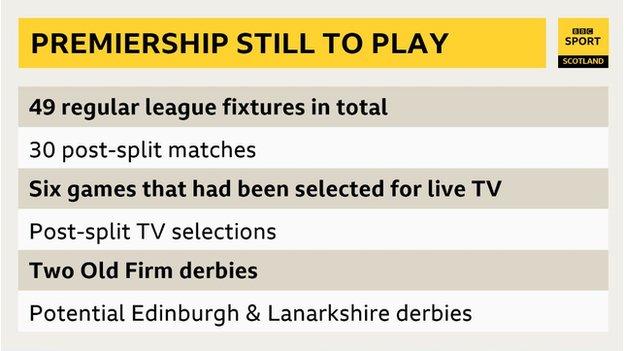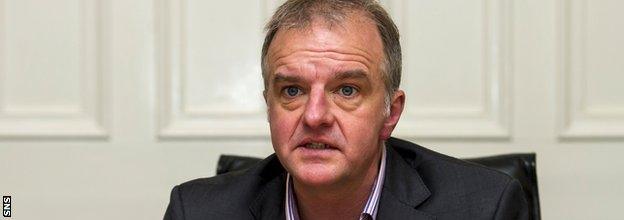What is Scotland's equivalent of England's 'Project Restart'?
- Published

All football in Scotland has been suspended since 13 March
England's top-flight clubs are discussing restarting the season, and held discussions with the government about doing so. So why are we not hearing similar talk about the Scottish Premiership?
The SPFL's lower-leagues have been declared, and the smart money seems to be on the top tier following, despite entreaties from some clubs to persist with the current campaign.
Scottish FA chairman Rod Petrie told BBC Scotland fans need to be "patient", but when might they next see their teams, either in person or on screen? What are the issues? And what is being done to try and rouse Scottish football from the suspension enforced on 13 March?
What is the medical advice?
Scottish football's Joint Response Group has commissioned six sub-groups of key football figures to advise on best way forward. Dr John MacLean is the Scottish FA's chief medical consultant and vice-president of Uefa's medical committee and is chairing the taskforce looking at medical and player welfare.
He has been the man conveying all the latest government, Uefa and World Health Organization advice, so it's safe to say he knows the score. And his stance is that a whole welter of things must happen before it is safe to start playing again.
In a Q&A published by the Scottish FA on Thursday, he spoke of the need to ensure social distancing and hygiene in shared environments, the practicalities of testing, and protocols for unwell players and staff among other things.
"When you list all the different aspects, it's quite a task," he said. "But we are motivated to find solutions."
'Avoid playing competitive football' - Fifa's medical committee chair
Then you've got the chair of Fifa's medical committee - Michel d'Hooghe - saying that "as a doctor" he would be "sceptical" about continuing this season and that looking to next term is the most sensible option.
This seems to be the direction of travel Scottish football is heading in.
The Joint Response Group has already prohibited the resumption of any organised football - including training - until 10 June. Then they advise six weeks before any SPFL games take place, which takes us very close to the end of July. And that is a best-case scenario.
Is there political will to play?
It doesn't seem like it. A couple of weeks ago, First Minister Nicola Sturgeon warned that Scottish football should not expect matches in front of fans "any time soon" and that playing behind closed doors needed to be "very carefully considered".
Since then, it has been announced that Scotland's minister for sport, Joe Fitzpatrick, will host a meeting next week involving several key sports.
However, football should not necessarily expect too much from that. It seems those talks will be more about bringing governing bodies up to speed with the latest thinking rather than thrashing out a definitive road map for resumption.

What is happening elsewhere?
Germany is planning a closed-doors return in May, and England has begun "Project Restart" with a view to the Premier League season recommencing with no fans in June.
However, the Dutch, Belgian and French leagues have been cancelled after their respective governments got involved, with the title awarded and relegation inflicted in the latter two competitions - both of whom, like Scotland, have lucrative new TV deals beginning next season.
Scotland will have to confirm whether - and if so how - they will fulfil the outstanding Premiership fixtures by Uefa's 25 May deadline, with the SPFL having already called the lower leagues.
Last month's controversial ballot has given the board the power to do the same with the top flight.
Speaking to BBC Scotland on Thursday, chief executive Neil Doncaster would not be drawn on how the season might end, but said all ideas should be considered to get players back on the pitch.
"I think we should be absolutely open-minded to any model that gets games up and running safely," he said.
But how much would that cost?
That's perhaps one of the biggest problems.
UK culture secretary Oliver Dowden hosted a meeting on Friday about "stepping up planning" for football's eventual return. He says he's been in touch with clubs about restarting the English Premier League "as soon as possible".
But to do so would need players to be tested and isolated. The cost of that grand plan? From £3m-£5m. The Premier League has that kind of money. The Scottish Premiership - which is heavily reliant on gate receipts - doesn't.
To run tests in order to complete the outstanding games has been estimated as costing somewhere between £100,000 and £200,000 per club. Factor in match officials and anyone else deemed essential to the 'normal' operation of Premiership games, and there's scant change from £2m at a time when clubs have little or no regular income.
"Testing is a big part of the plan south of the border and the costs are envisaged to run to millions of pounds - that is very significant in terms of our revenues in Scotland," Doncaster added.
What about the moral dilemma?
Is it right that footballers - or any other athletes - get screened when many key frontline workers are also in the queue?
Then there's what Cowdenbeath chairman Donald Findlay called the "ethics" of resuming football behind closed doors simply for financial reasons.
"I'm frankly appalled by the idea," Findlay told BBC Scotland on Thursday. "Are we really going to take first aiders away from dealing with this pandemic to sit and watch while football games are going on? Come on."
Has anyone asked the players?

Fraser Wishart has written to clubs asking them to use the government's job retention scheme
Apparently not. The Joint Response Group sub-group chaired by Dr MacLean - one of six comprising 69 Scottish football figures - has been deputed to look at player welfare as well as medical concerns.
But PFA Scotland chief executive Fraser Wishart spoke the other day about players' opinions seeming to be "largely overlooked" - a view also alluded to by his chairman, Liam Craig.
Wishart has since written to all 42 clubs asking them to use the government's job retention scheme to extend players contracts until at least the end of June and for longer, should the furlough programme be extended. That would offer some security for those whose deals expire at the end of May.
Wishart - who is on another sub-group dealing with club and stadium operations - previously insisted that testing, insurance and income protection would need to be put into place, but that he thinks "it's going to be very difficult" to complete the Premiership season.
Are there not bigger things to worry about?
Many people think so, yes. Several Scottish football chairman - most recently Cowdenbeath's Findlay - have spoken about the risk of clubs going to the wall without gate receipts to keep them going.
The payment of prize monies to the lower-league clubs has helped but, with senior figures having suggested from the start of the outbreak that football is unlikely to resume until the summer at the earliest, a testing time still lies ahead.
Scotland's top flight remains similarly in limbo. Many people are desperate for it to resume soon. But the cold, hard reality is that it probably won't, and we need to get used to that idea.
Indeed, the bigger priority is trying to make sure there are still 42 clubs left when the whistle finally sounds again.